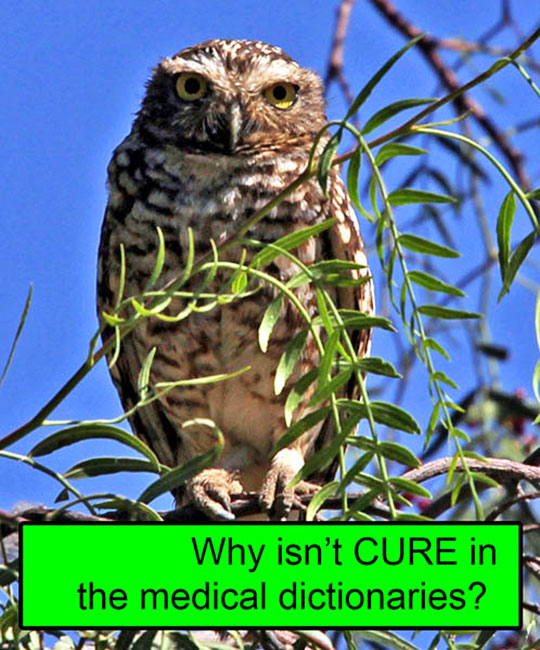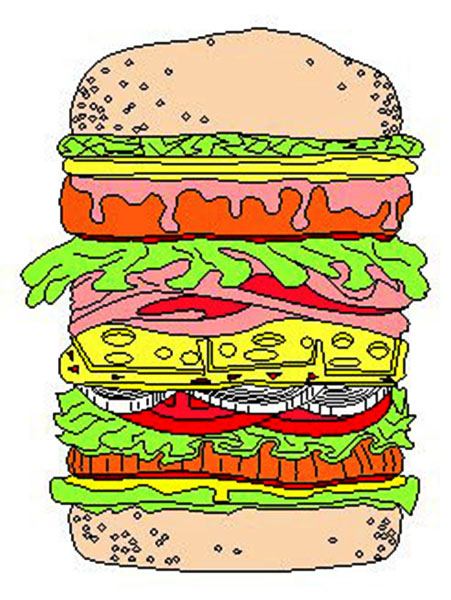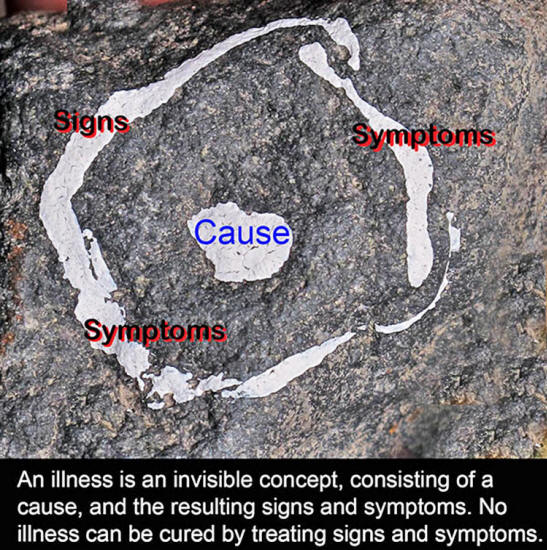|
by Tracy Kolenchuk First Published July 20, 2016
Updated
July 21, 2019 Can medicine cure?
Three years ago, I reported that Webster's New World Medical Dictionary does not contain the words cure, cured, cures, nor incurable.
I thought it was an exception.
The words "cure" and "incurable",
I have a constantly growing list of medical dictionaries that don't define cure, cures, curing, cured, nor incurable.
Three years after discovering the disappearance of cure from medical dictionaries, my research into the concept of cure led to publishing of a book about cure, covering the three general causes of illnesses, the illnesses that result, and the cures required for each: Cure is also not defined and not in the index of most, if not all major medical references, including:
In consistent fashion the DSM 5, the Diagnostic and Statistical Manual of Mental Disorders does not contain the word "cure" in the index. Cured is not defined for mental illness.
Note: cure is defined in healthicine.
Seriously? What is going on? Cure is truly a forbidden four letter word in medicine. Why?
Today's medical practice has serious challenges with the word cure. There are cures, of course, and reference books like MERCK's Manual of Diagnosis and Therapy occasionally refer to them as cures.
But much of the use of the word 'cure' in MERCK, and other references, is inconsistent. "Cure" is not well defined in medicine.
A large number of the uses of the word 'cure' in MERCK are actually 'incurable' or 'cannot be cured'. It is not scientifically possible to prove that a disease cannot be cured. I have traced this back through many editions of MERCK.
Even in the 1950s "cure" hardly appeared in MERCK, was not defined, and was not used consistently.
I do not have resources farther back, except the original version of MERCK, where cures were commonly suggested, but as near as I can determine, correctly in one single case.
If you do have access to earlier versions of MERCK's editions, I would appreciate your assistance to study this question.
It is interesting to take a simple illness: scurvy, for which the cure appears to be well known. MERCK, Harrison's, and Lange's each contain entries for scurvy.
But all three
recommend treatments - and do not use the word cure Only one, MERCK, actually provides a cure (as an aside, and the word cure is not used). Harrison's and Lange's recommend a treatment that does not cure.
According to the U.S. FDA, you cannot claim a nutritional cure for scurvy unless you also say,
Cures are not defined by science, instead, they are "defined NOT" by politics.
A common use of cure, in the current edition of MERCK, and in many medical references is the phrase 'cure-rate'. Cure rate better described as cure-wait. A cure-wait(rate) is defined by waiting a specified period of time.
If you wait 5 years, and the patient is still alive, and the patient is cannot be diagnosed with cancer, then we have established a 'five year cure-wait'.
Calling it a cure-rate is bureaucratic nonsense, propaganda.
Many organizations that raise funds to 'fight' illness avoid the word 'cure'. The American Cancer Society's mission statement does not contain the word 'cure'.
The U.S. Cancer Moonshot initiative does not contain a definition of cancer cured.
When cure is used, it is seldom defined, and perhaps most important, cures are not counted. If you cure your illness, whether it be a cancer, a depression, or even something as simple as scurvy, the cure is not recognized, cannot be counted.
Obesity cannot be cured, because the cure is 'not something' and 'not something' cannot be a cure in today's medical science.
Cures cannot be counted, because cured is not defined, there are no tests for cured. As a result: cures do not exist. There are remissions, and spontaneous remissions, but there are few cures.
What's the difference between remission and cure?
Anyone can claim remission - nobody cares. There is no test for remission. But nobody can claim cured. Cured is not defined. So if you claim to cure, you're a quack.
In conventional medicine cure is generally as a substance or treatment that cures. That's why there is "no cure for the common cold", even though every healthy person cures their own, and when they are healthier they cure it faster. Cures accomplished by health are not recognized by the field of medicine.
As a result, there are many invisible cures.
Can any illnesses be cured with medicine? Of course...
Illnesses caused by parasites, infections, pneumonia, etc. are cured by antibiotics. Illnesses caused by fungal infections are cured by anti-fungal medications. There are well defined tests to ensure that the cure is complete.
So, why does cure not appear in most medical dictionaries.
There are many illnesses that can be cured, but not by medicines. Any illness caused by a lack of healthiness - from arthritis, to depression, to heart disease and hypertension, and even obesity - cannot be cured by medicines.
They are not caused by a parasite that can be killed. They can only be cured with health.
All illnesses caused by deficiencies, whether it be scurvy, caused by a nutritional deficiency, or bedsores, caused by a deficiency of movement, a deficiency of physical stress - can only be cured by addressing the cause. No medicine can cure these conditions.
Any illness caused by toxicity, by toxic chemicals, or even toxic social environments, cannot be cured by medicines. These can only be cured by addressing the cause.
Cure and cause are linked. But not, apparently, in modern medicine. Medicines treat symptoms, and ignore cause. As a result, cure is disappearing from our medical systems, our medical texts, our medical dictionaries, and the science and technology of medicine.
Every cause of an illness is as a lack of healthiness, even parasitic illnesses.
We don't get an infection 'because' of the infecting bacteria, we get an infection because of a cut, or sometimes because of a weakness in our immune system - that would normally defend us. The best medicines work by improving healthiness.
But today's medicines do not improve healthiness. Many intentionally reduce healthiness, in hope that the illness will be harmed more. Today's medicines cannot improve healthiness.
So these medicines cannot cure. So cure is not in the medical dictionaries.
How can we cure, if cure is not in the medical dictionary?
This is the way of science.
Until we do this, medicine will always be a practice of superstition, depressing symptoms, and patients and even their families, while never actually curing any illness, never claiming to cure any illness.
There is a myth, that medicines are intended to cure. But it is only a myth...
Can we define cure? Can we define cured? Yes.
To cure an illness is to successfully address a cause.
Note: only a specific case, only an illness can be cured. No disease, no general class of an illnesses can be cured. Every cure is an anecdote. An illness is cured when the cause is successfully addressed. We need to cure illnesses, one at a time.
There are three useful, commonly understood definitions of cure:
Today, medicine is stuck on 'symptoms', working to treat symptoms.
When we work to treat symptoms, we have a problem. A symptom, even in a single patient, whether it be a cough, or depression, or a cancer, can have many individual causes.
When we treat just signs and symptoms, we can't tell if we are addressing the cause, we can't tell if we are curing the illness or no.
It is possible, perhaps common for a patient to be suffering from two or three illnesses of depression, to be two depressed, not too depressed.
Modern medicine makes no attempt to cure depression - although if you go back 50 years, most cases of depression were easily cured by health.
Every illness, every single illness is a link between CAUSE and SYMPTOMS.
Disease is commonly diagnosed by symptoms, not by cause. As a result, any diagnosis of a disease might actually be several cases of illness.
This makes the 'disease' very difficult, seemingly impossible to cure. Today, when a disease is cured, it's a miracle, not a medicine.
Every illness has many possible cures, related to the cause or the causal chain. We can define the Elements of Illness, and use that definition to search for cures.
A disease, without a cause that can be addressed, cannot be cured. If cure is not defined, if cure is not in the dictionary, we might as well be hunting a wumpus.
Once we build a basic understanding, we can begin to cure. We can create a science of cures. We have medical technologies. But we don't need technologies of medicine to cure, we need a language of medicine.
We can put 'cure', cures, and cured, back into the dictionary - and work to remove 'incurable'.
Note:
The new, 2016 edition of Webster's Medical Dictionary, does contain the word cure. However, the definitions provided are simplistic pap, food for babies, not for scientists.
It offers,
Incurable also appears in this new edition, but unfortunately, it is defined as "impossible to cure", in contradiction with Barron's definition, and in contradiction with science and common sense.
It is simply not possible to prove that any illness cannot be cured, without trying every possible treatment - which is not possible.
But we can hardly fault Webster's, or MERCK's, or Harrison's, or Lange's, or Barron's or Bantam for not publishing the word cure, or not providing a scientific definition.
The fault lies in the science, or the non-science, of today's medical bureaucracies.
|




